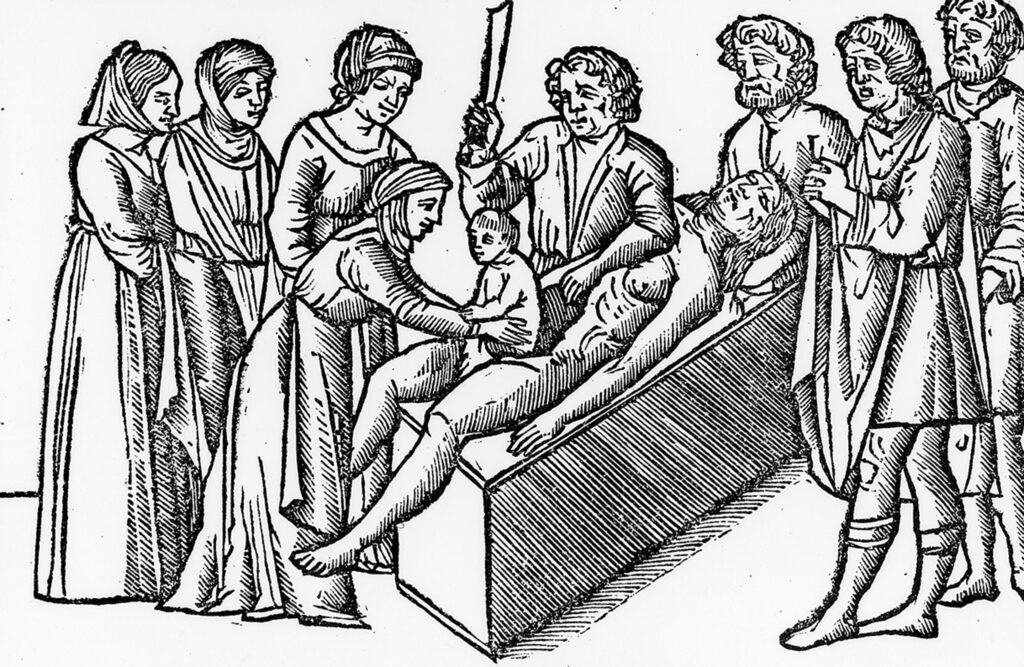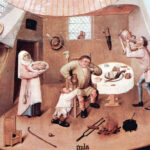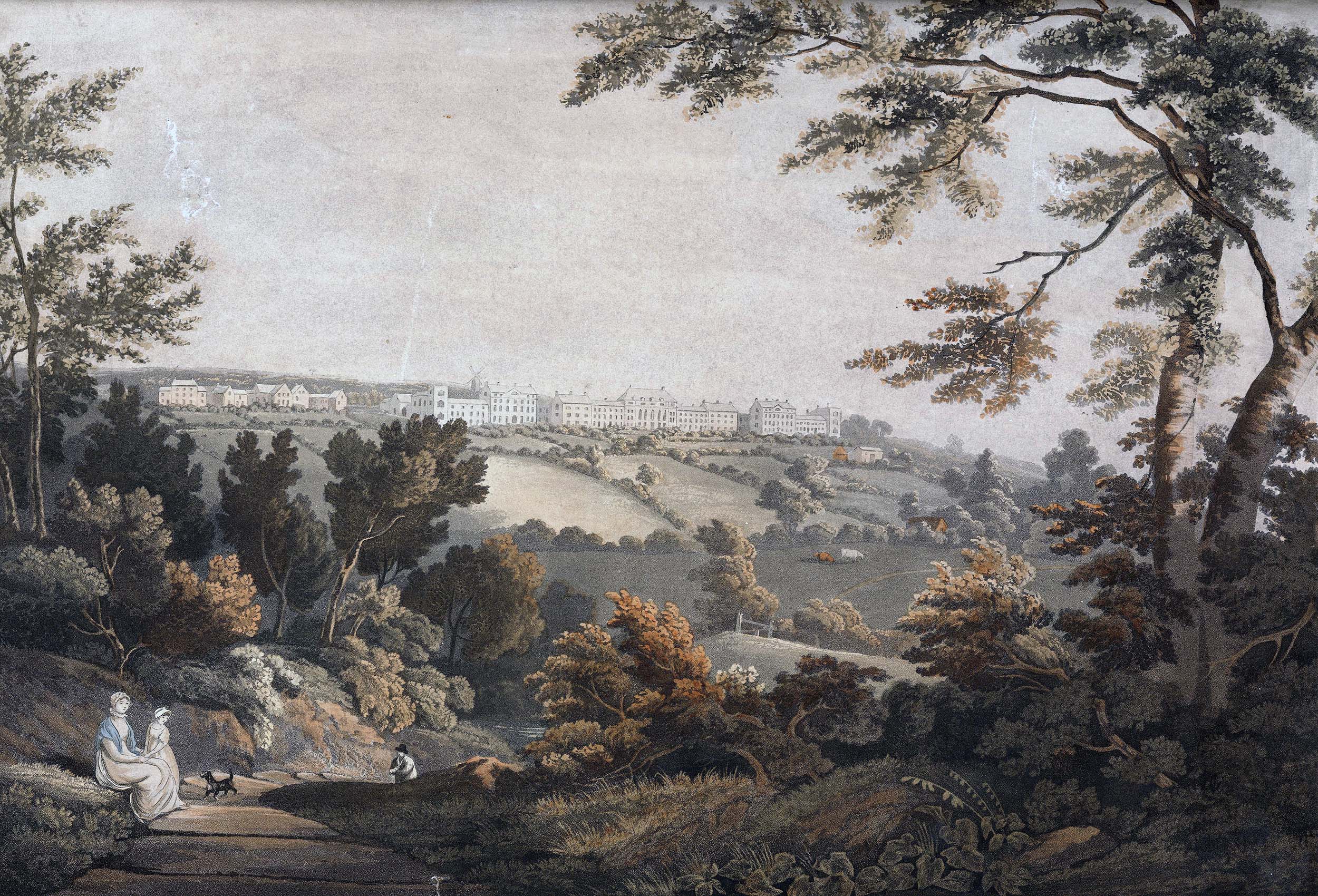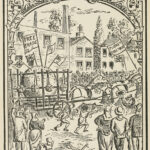29 December 1759: In an unusual case of genitive determinism, “Julius Caesar” Ibbetson – painter at first of ship’s hulls and later of landscapes – is delivered from his dead mother at Farnley Moor (Leeds)

The (legendary) birth of Julius Caesar by Caesarean section (Suetonius Tranquillus 1506).
Julius Caesar Ibbetson. 1828. An Accidence, or Gamut, of Painting in Oil. Ed. Bella Ibbetson. London: Harvey and Darton. Rotha Mary Clay p.98 credits the the introductory “Memoir of the author’s life” to Bella, née Thompson Get it:
.Unedited excerpt
If an excerpt is used in the book, it will be shorter, edited and, where applicable, translated.
Memoir of the author’s life
Richard Ibbetson, the father of the artist, was by birth a Yorkshireman; but, in his youth, a resident in London. About the same time, the Moravians, a Christian sect newly arrived in this country, attracted some notice; and their peculiar manners and habits were a subject of ridicule with many, among whom was Ibbetson. However, having been once induced to attend their chapel, he was so much impressed by the evident piety of the people, and by the simplicity of their mode of worship, that the scoffer became a convert. He joined their fraternity immediately, accompanied them to Yorkshire, and was one of the first inhabitants of their establishment at Fulneck, where he resided many years as a single brother. When upwards of fifty, he became enamoured of a very young woman, the daughter of Julius Mortimer, a neighbouring farmer, and married her. For this he was formally expelled, as the members of their society were not permitted to choose a partner for themselves; but he continued to attend divine service at their chapel, and occasionally played the organ, being a great proficient in music.
The first fruit of his marriage was a daughter, long since dead; and secondly, the subject of this memoir. In consequence of an injury received by a fall on the ice, when in an advanced stage of pregnancy, his mother died in premature labour, at the age of nineteen; and her infant was brought into the world by the Cæsarian operation, on the 29th of December, 1759: hence his name of Julius Caesar.
Comment
Comment
Rotha Mary Clay on Ibbetson’s middle name:
Some incredibly grim person, perhaps the local surgeon, gave him as second name Caesar, because of the manner of his coming into the world. It is small wonder that he himself kept to Julius throughout his life; although, curiously enough, the full name was handed down to son and grandson (Clay 1948).
Ibbetson was variously said to have been born at Scarborough or Masham until in 1948 Rotha Mary Clay (p.121) cited a letter from him to John Staveley establishing that it was Farnley Moor:
I was born in the neighbourhood of Farnley Hall (which I believe belongs to you) at Farnley moor-top. My mother a daughter of old Julius Mortimer, who used to exult that Squire Danby had told him that his name was a grand one. I mention this because you understood I was from the neighbourhood of your present residence.
An anecdote:
Ibbetson and Rathbone were two noted second-rate landscape painters, who flourished in the joyous days of the thoughtless George Morland, who formed the apex of that triumvirate of eccentricity, tom-foolery, and talent.
Ibbetson was superior to Rathbone, and Master George much cleverer than both rolled into one. These frolicsome blades would paint together, drink together, smoke together, and when royally “how come you so?” strip and fight together, for pure love. They were inseparables, until separated by the ring, when they had beaten each other into a sort of half-sober reflection, sufficient to shake hands and take t’other magnum bonum.
Their excesses got them fame, and as I said before, increased their patrons. Reasonable enough with those who love all that is outré, such would reason thus, when they did reason: He that could paint like this when drunk, what could he not do when sober! But as Bonnell Thornton truly observed, “The way to some men’s patronage is not to deserve it.”
From London to Ambleside is nothing on the map; in the imagination it is still less; from Ambleside to Troutbeck is only a step. In this beautiful region of the picturesque – Ambleside – Ibbetson in his latter days took up his quarters. Once he sojourned in the little village of Troutbeck, and there he painted a sign.
The little inn in this sequestered spot, so well known by artists, and so much noted by tourist, was kept by Thomas Burkett. There were days for living, and O! what nights for supping! – A roasted hare, a trout, pastry, good ale, and healthful homespun sheets, for eighteen pence; but these days and nights are clean worn out of date.
How Ibbetson contrived it mine authority knoweth not, but that he did get scored upon the slate beneath the clock, to the tune of some four or five-and-twenty pounds, to the grief of mine host and his homely hostess, is as certain a fact as paying your shilling and kissing the book could make it.
What was to be done? The village held conclave. “He is a genus,” said the exciseman, “and a mortal kind heart,” added the farrier. “Dang it! I regard him too,” said the landlord. “He brings custom to the house,” said the landlady, “and he will pay some time.” “Ah! that he wool, I’ll be bound,” rejoined mine host, “and we must wait.”
“I’ll paint you a sign,” said Julius Ibbetson, and he kept his word like a Caesar, and there I saw it, and that with mine own two eyes, as the market folks say, about seven years ago.
The Sign. – Two heads, very well painted, the one a slender, pale-faced, rather genteel subject, the other a jolly, ruby-faced, farmer-looking wight; beneath which was the following, contributed by the joint stock company of wit of the village of Troutbeck:
Thou mortal man, that liv’st by bread,
What makes thy face to look so red?
Thou silly fop, that looks so pale,
‘Tis red with Tommy Burkett’s ale.“Some men are better known than trusted,” says the adage. Not so with John Julius Ibbetson. Another story, to wit:
He rented a house with a rural orchard and useful garden. I think there was a paddock too. It was just such a bargain as would suit a landscape painter who was philosopher enough not to covet a drawing-room. His landlord got no rent. So, said Mr. Otley, “paint me a picture annually, to the value thereof.” But that thief of time, old Procrastination, would all on Ibbetson, and sit in his chimney-nook, and they would smoke together from month to month, and when December came, “The devil himself,” said Ibbetson, “cannot hold his pencil with his fingers cold. I’ll do it in the spring.”
To make an end of my story, the worthy landlord at length obtained somewhere about the average of three pictures for four years’ rent, and both parties, saith my informant, were content.
Ibbetson was a clever artist, and painted with a free touch; his palette was simple, and his colouring bright and fresh. I speak of his best pictures. He was expeditious, generally worked “from hand to mouth,” and was much employed by the inferior class of picture-dealers, who like himself were sots, and pot companions with him, Morland, and their aforenamed cronie, Rathbone… (Z. 1824/08/21).
Something to say? Get in touch
Similar
 19 October 1816: Serenaded by the military, decorated barges leave Leeds for Liverpool to celebrate the completion, after almost 50 years, of the canal uniting east and west
19 October 1816: Serenaded by the military, decorated barges leave Leeds for Liverpool to celebrate the completion, after almost 50 years, of the canal uniting east and west 22 September 1465: A menu for the enthronement at Cawood Castle of George Neville as Archbishop of York
22 September 1465: A menu for the enthronement at Cawood Castle of George Neville as Archbishop of York
Comment
Comment
Something to say? Get in touch
Search
Donate
Music & books
Place-People-Play: Childcare (and the Kazookestra) on the Headingley/Weetwood borders next to Meanwood Park.
Music from and about Yorkshire by Leeds's Singing Organ-Grinder.




 Bluesky
Bluesky Extwitter
Extwitter